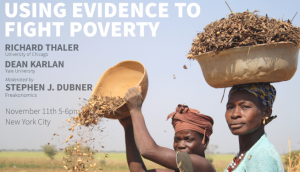What Do You Want to Know About Fighting Poverty With Cash Payments?
 If you happen to be in New York on Mon., Nov. 11, you might want to come see Richard Thaler and Dean Karlan talk about “using evidence and behavioral economics to fight poverty.” The event (info here) is run by the Innovations for Poverty Action, of which Karlan is president. I will moderate the Thaler-Karlan discussion — which means I get to ask them any questions I want about whether and why it is a good idea to fight poverty by giving cash directly to poor people rather than the traditional means of directing aid toward institutions and hoping that it trickles down fruitfully. (There are, of course, more options than just those two.)
If you happen to be in New York on Mon., Nov. 11, you might want to come see Richard Thaler and Dean Karlan talk about “using evidence and behavioral economics to fight poverty.” The event (info here) is run by the Innovations for Poverty Action, of which Karlan is president. I will moderate the Thaler-Karlan discussion — which means I get to ask them any questions I want about whether and why it is a good idea to fight poverty by giving cash directly to poor people rather than the traditional means of directing aid toward institutions and hoping that it trickles down fruitfully. (There are, of course, more options than just those two.)
In our recent podcast called “Would a Big Bucket of Cash Really Change Your Life?,” we looked at whether a windfall helps a family across the generations. The short answer, at least in the case of the 19th-century land lottery that we discussed: no.
IPA and others have found that giving cash directly indeed moves the needle in the right direction — but one obvious question is whether that momentum can be maintained, and if a family that starts doing better in the short term can create long-term gains for their children, grandchildren, etc.
What other questions shall I ask Thaler and Karlan? I’d love to have your input. They are both bright guys, so I’m sure they can handle anything related to econ or development, but I’d particularly like to know what you want to learn about the idea of cash transfers, whether conditional or un-. Thanks in advance.

Comments